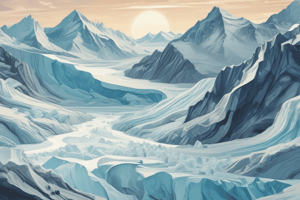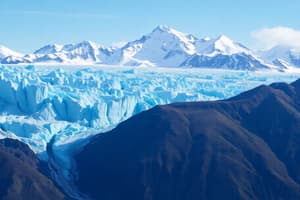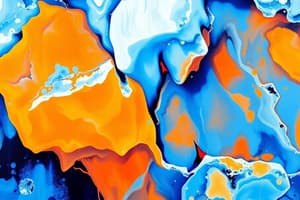Podcast
Questions and Answers
What is the primary distinction between a glacier and an ice sheet?
What is the primary distinction between a glacier and an ice sheet?
- A glacier is smaller and covers less than 50 thousand kilometers.
- An ice sheet is a type of glacier formed by thawing ice.
- An ice sheet is larger and covers more than 50 thousand kilometers. (correct)
- A glacier does not move, whereas an ice sheet does.
Which term refers to the cooler periods marked by the expansion of glaciers?
Which term refers to the cooler periods marked by the expansion of glaciers?
- Glacial Period (correct)
- Interglacial Period
- Milankovitch Cycles
- Glacial Advance
What happens during a glacial retreat?
What happens during a glacial retreat?
- Glaciers shrink and move back. (correct)
- The glaciers significantly expand.
- Ice forms more rapidly in the polar regions.
- The ice sheets are at their largest extent.
What do Milankovitch Cycles primarily influence?
What do Milankovitch Cycles primarily influence?
During which period did early human ancestors first develop rudimentary stone tools?
During which period did early human ancestors first develop rudimentary stone tools?
What is characterized by a warmer phase between glacial periods?
What is characterized by a warmer phase between glacial periods?
What is the Ice-Albedo Effect?
What is the Ice-Albedo Effect?
What do glacial-interglacial cycles denote?
What do glacial-interglacial cycles denote?
What tool culture emerged during the period marked by increased symbolic behavior and early burials?
What tool culture emerged during the period marked by increased symbolic behavior and early burials?
Which of the following is NOT a characteristic of the Upper Paleolithic period?
Which of the following is NOT a characteristic of the Upper Paleolithic period?
What significant transition characterized the Mesolithic Era?
What significant transition characterized the Mesolithic Era?
Which phase of the Neolithic Era is defined by the absence of pottery and the beginnings of agriculture?
Which phase of the Neolithic Era is defined by the absence of pottery and the beginnings of agriculture?
What advancement marks the Neolithic Pottery Phase of the Neolithic Era?
What advancement marks the Neolithic Pottery Phase of the Neolithic Era?
During which era did modern humans develop complex societies and art forms such as cave paintings?
During which era did modern humans develop complex societies and art forms such as cave paintings?
Which of the following features is associated with the Neolithic Era?
Which of the following features is associated with the Neolithic Era?
What is a common tool type from the Mesolithic Era?
What is a common tool type from the Mesolithic Era?
Flashcards
Glacier
Glacier
A large, slow-moving mass of ice formed from compacted layers of snow.
Glacial Period
Glacial Period
A time during which glaciers expanded significantly across the Earth.
Ice Age
Ice Age
A period in Earth's history with extensive ice sheets and glaciers.
Glacial Retreat
Glacial Retreat
Signup and view all the flashcards
Paleoclimate
Paleoclimate
Signup and view all the flashcards
Milankovitch Cycles
Milankovitch Cycles
Signup and view all the flashcards
Solar Insolation
Solar Insolation
Signup and view all the flashcards
Ice-Albedo Effect
Ice-Albedo Effect
Signup and view all the flashcards
Upper Paleolithic
Upper Paleolithic
Signup and view all the flashcards
Mesolithic Era
Mesolithic Era
Signup and view all the flashcards
Neolithic Era
Neolithic Era
Signup and view all the flashcards
Neolithic Pre-Pottery Phase
Neolithic Pre-Pottery Phase
Signup and view all the flashcards
Neolithic Pottery Phase
Neolithic Pottery Phase
Signup and view all the flashcards
Middle Paleolithic
Middle Paleolithic
Signup and view all the flashcards
Study Notes
Glacial Phenomena
- Glacier: A large, slow-moving mass of ice formed from compacted snow.
- Ice Sheet: A massive glacier covering a large land area (greater than 50,000 square kilometers).
- Glacial Period: A time marked by glacier expansion.
- Ice Age: A period with extensive glaciers and ice sheets.
- Glacial Advance: When a glacier grows and extends.
- Glacial Retreat: When a glacier shrinks and moves back.
- Interglacial Period: Warm periods between glacial periods, with ice sheet retreat.
- Paleoclimate: The study of past climates, including glacial cycles.
- Milankovitch Cycles: Cyclical changes in Earth's orbit and tilt, influencing climate over long periods.
- Solar Insolation: Amount of solar energy reaching Earth, impacted by Milankovitch Cycles.
- Glacial-Interglacial Cycles: Repeating advances and retreats of ice sheets, tied to Milankovitch Cycles.
- Ice-Albedo Effect: Ice reflecting sunlight, cooling Earth; less ice leads to warming.
- Glacial Maximum: Peak ice sheet extent during a glacial period.
- Geological Time Scale: Timeline of Earth's history, placing events like glaciation.
Eras of Human History
Paleolithic Era
- Paleolithic Era (Old Stone Age): From 2.5 million years ago to 10,000 BCE.
- Characteristics: Rudimentary stone tools, hunting and gathering, early societies.
Lower Paleolithic
- Time Period: 2.5 million to 300,000 years ago.
- Characteristics: Simple stone tools (e.g., hand axes), early Homo (e.g., Homo habilis & Homo erectus), possible fire control, basic social structures.
Middle Paleolithic
- Time Period: 300,000 to 40,000 years ago.
- Characteristics: More advanced stone tools (e.g., Mousterian tools), Homo neanderthalensis and early Homo sapiens, increased evidence of symbolic behavior, burials.
Upper Paleolithic
- Time Period: 40,000 to 10,000 years ago.
- Characteristics: Modern humans (Homo sapiens), advanced tools, art (cave paintings, carvings), complex societies, sophisticated hunting, long-distance trade, structured dwellings.
Mesolithic Era
- Time Period: Roughly 10,000 to 8,000 BCE (varying regionally).
- Characteristics: Transitional period, gradual shift from hunting and gathering to agriculture, specialized tools (microliths), .
Neolithic Era
- Time Period: Begins around 10,000 BCE.
- Characteristics: Agriculture, animal domestication, permanent settlements, advancements in pottery and tool-making, social hierarchies.
Neolithic Pre-Pottery Phase (PPNA)
- Time Period: 10,000 to 7,000 BCE.
- Characteristics: Early farming, settlement, use of mud-brick structures, no pottery.
Neolithic Pottery Phase
- Time Period: 7,000 to 5,000 BCE.
- Characteristics: Widespread pottery use, advanced technology and culture, growing communities, trade, social stratification, specialized crafts.
Studying That Suits You
Use AI to generate personalized quizzes and flashcards to suit your learning preferences.




